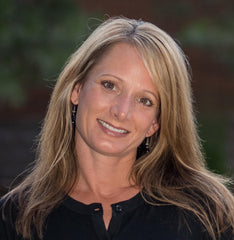 Morgan Tyree is a professional organizer (“chaos calmer”), writer (“list lover”), and fitness instructor (“exercise enthusiast”). She believes in setting priorities and measuring progress one day at a time, while also keeping things simple. Morgan earned her degree in business administration with an emphasis in small business and entrepreneurship from the University of Oregon and has worked in marketing, management, and human resources. She blogs weekly at Morganize with Me and contributes monthly to the popular blog Organizing Junkie. The author of Take Back Your Time, Morgan lives in Fort Collins, Colorado, with her husband, David, and their three children; she serves clients locally in the Denver area and virtually wherever they happen to be.
Morgan Tyree is a professional organizer (“chaos calmer”), writer (“list lover”), and fitness instructor (“exercise enthusiast”). She believes in setting priorities and measuring progress one day at a time, while also keeping things simple. Morgan earned her degree in business administration with an emphasis in small business and entrepreneurship from the University of Oregon and has worked in marketing, management, and human resources. She blogs weekly at Morganize with Me and contributes monthly to the popular blog Organizing Junkie. The author of Take Back Your Time, Morgan lives in Fort Collins, Colorado, with her husband, David, and their three children; she serves clients locally in the Denver area and virtually wherever they happen to be.
Dr. Barb: We know that it's new-year, new-you season, when many of us are hoping for a fresh start. With that in mind, we've invited a professional organizer who offers her services to help people calm the chaos of their lives. In addition to her work with individuals, Morgan Tyree publishes a blog and a podcast and has just published a book, Take Back Your Time. Welcome, Morgan.
Morgan: Thank you for having me.
Dr. Barb: Have you always loved organization or was that something you've grown into?
Morgan: Yeah, I would definitely say that I've always loved it. I grew up in a home where my dad was a custom home builder and my mom was a designer, so I grew up with just that being modeled as a lifestyle—of really creating a home and creating a haven, so to speak, and I am also left-brain dominant, so I have a sense of just detail and order. It sort of comes naturally to me, so there's a bit of nature and nurture, I would say.
Dr. Barb: And you call yourself a "chaos calmer," which is a great way to frame organizing. So what do you see as the impact of chaos?
Morgan: Well, what I see so much from my clients is, the word that comes out more often than not, is that clients that I work with, they feel overwhelmed. I think they get to a point, and typically by the time they've reached out to me, they just have gotten to a point where they feel really stuck and overwhelmed because things have just gotten to a point where they really feel almost stuck, and they don't really know where to start. And so that's why I kind of like... I talk about kind of calming that chaos because the feeling of overwhelm, nobody really wants to be in that feeling or that position for very long. And so the goal of calming things down is to bring some of that order back into our lives. Because to stay in overwhelm, we can't stay in that mode for very long. It can wear on us pretty quickly.
Dr. Barb: So is it true that most individuals are wired to need some sense of semblance, or are there truly people who can function around chaos and make that their norm and make that work?
Morgan: That's a good question. I definitely think that we all have our individual hard wirings and our personalities and that's one thing I'm really careful to assess with people and with my clients is to sort of determine kind of their clutter capacity or their threshold. What their tolerance is for maybe their level of chaos in their home. Because we all can thrive different differently in different environments, and so I think it's really kind of knowing yourself and knowing maybe what things trigger you or kind of what your tipping points are, because what may push you to that point of overwhelm, might be different than me. So it's definitely good to kind of identify what those things are for you as an individual because it's going to be different from person to person.
Dr. Barb: From what you observe with your clients, does that impact take different forms at different stages of life?
Morgan: Yeah, I think that there's so many life seasons we go through and some natural ones can be maybe if we have children or when children leave the home or if we're maybe helping our parents as they're aging and there's different cycles of life or transitions that we go through, or even downsizing or major moves, those types of things can add different pressure points and we may be able to increase our tolerance or capacity for more chaos in those seasons, or we may feel like we need to kind of tighten and have more control. And so again, it's sort of, I think, whenever you enter new phases of life, it's important to kind of do almost a reevaluation and maybe a re-prioritization of saying, "What do I need in this season to help me kind of manage the level that works for me day in and day out?"
Dr. Barb: So a lot of the women I see in my day to day job and practice and a lot of the women who will be listening are at transition in their lives. Often empty nest, maybe downsizing in their home, reinventing themselves. Maybe taking on new and different responsibilities professionally. Maybe parents, aging parents have even entered their own homes. So how do you help someone kind of navigate or recognize the needs that we need to put in place for those new transitions?
Morgan: Yeah, so those transitions can be really challenging because oftentimes they're new territory for people depending on what they've had to go through before. And also you're often having to balance multiple personalities, or different approaches. And so there's a couple things I recommend. I think that there's always a place for lots of communication. I think it's the more you can communicate the better between the different parties, because usually there's several people involved. So I would really encourage people to communicate, almost over communicate. And then the second C word I would say is to consider compromising where you can, because I'll get a lot of questions when I speak sometimes about what do I do about this thing that I don't want to keep, but somebody else in my house wants to keep or whatever it might be. And when we share households we have to consider, or when we're helping somebody, whether it's a transition of some kind, there's an element of maybe listening to the other person and compromising on certain things.
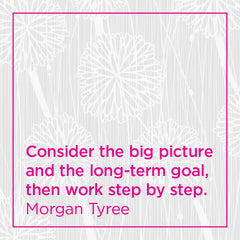 So just remembering that there's a process to all these things in life. And there may be times where you have to maybe give in a little bit, but also maybe if someone's talking to you and kind of saying, "In the big picture, it's time to really be honest with yourself and maybe cut some of these things out." To really let someone speak into you. So being open. And I think the biggest thing I'd really say is that when you're in a big transition of that kind or entering new territory is to think of the big picture. Because often we get kind of drowned and we get really into the details of it in front of us and it's overwhelming, which is natural, but just consider the big picture and kind of what the long term goal is and then work step by step.
So just remembering that there's a process to all these things in life. And there may be times where you have to maybe give in a little bit, but also maybe if someone's talking to you and kind of saying, "In the big picture, it's time to really be honest with yourself and maybe cut some of these things out." To really let someone speak into you. So being open. And I think the biggest thing I'd really say is that when you're in a big transition of that kind or entering new territory is to think of the big picture. Because often we get kind of drowned and we get really into the details of it in front of us and it's overwhelming, which is natural, but just consider the big picture and kind of what the long term goal is and then work step by step.
Dr. Barb: And when I think about moving forward, as you've outlined, I generally think of the women in the household as sort of being the key point person. But from what you've just said, it sounds as though in your work you probably tried to integrate every member of the household or is just the woman the point person? How do you try to make it successful in the household?
Morgan: Well, it's interesting because, I mean, every situation is sort of unique in the sense of what I walk into. So I have to, again, be really sensitive and assess sort of what the situation is and what we're moving towards. And a lot of times really my role is a little bit of neutrality because it's, again, kind of coming back to compromise and communication. I'm trying to help bring the parties together because often, for example, if you're trying to help a parent downsize, it might be really emotional for them to be letting go of certain things. And so if I can come in, I might be a better kind of buffer almost because I'm more neutral than maybe their child would be, and they might be more direct to their child than they might be to me. And so there's a real role of sensitivity that I play, but also I try to, again, keep bringing them back to the big picture because if they're moving from a three-bedroom home into something much smaller, they have to be realistic too. So there's a lot of sensitivity that has to be involved.
Dr. Barb: So what's your advice for people who are trying to find enough calm to actually start the process?
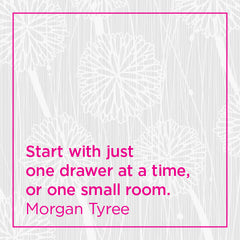 Morgan: Well, here's what I often see is that people, they get to that point where they feel so overwhelmed, and so I feel like their automatic mindset is they just want to like fix it all, you know? So they're just like, "I want the house organized." Or, "I want it to look like this." Which is I think kind of may be a natural tendency. But my suggestion is is to think of it as a process and to start small, because we can work in steps much more easily than we can trying to bite off more than we can chew. Because what happens is if we just start out real gung ho, we lose steam pretty quickly and then we almost get so discouraged that nothing really gets accomplished. And so that can be as simple as starting it with just one drawer at a time, or one small room at a time.
Morgan: Well, here's what I often see is that people, they get to that point where they feel so overwhelmed, and so I feel like their automatic mindset is they just want to like fix it all, you know? So they're just like, "I want the house organized." Or, "I want it to look like this." Which is I think kind of may be a natural tendency. But my suggestion is is to think of it as a process and to start small, because we can work in steps much more easily than we can trying to bite off more than we can chew. Because what happens is if we just start out real gung ho, we lose steam pretty quickly and then we almost get so discouraged that nothing really gets accomplished. And so that can be as simple as starting it with just one drawer at a time, or one small room at a time.
I mean, it can be really simple to declutter and tidy a small bathroom, so start small and start getting some progress on some decluttering and organizing, and kind of prioritize. And that's one thing I do with my clients is when I do an a consultation, we always go through and we talk about the priorities. Because if the project is just to organize the whole house, that's too vague and that's too unclear. So we communicate priority one, priority two, and then we work down the list. Because when you can see things done start to finish, it gives you that kind of reward and satisfaction, and a lot of organization, it gets real, almost, messier before it gets better. And so if you work in a more intentional way, it can actually... It really can help the process versus almost getting it all messed up and then you feel like, what do I even do? So that's the best approach.
Dr. Barb: What do you find as recurring obstacles to getting going or staying motivated and maybe once someone's completed the project, is it likely they'll be able to maintain that or do people fall back to old habits, and how would you advise them on that?
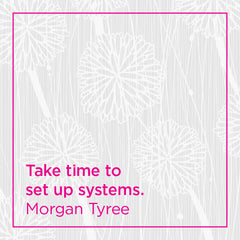 Morgan: Okay, so there's two parts to answer that. And the first is making sure you take time to set up systems. And so that's kind of the first part of organizing. And so that's setting up a system, whether that's a command center when you walk in your house, so the mail and the keys have a spot. And so it's setting up the systems first. That's kind of getting organized, and that does require time and some motivation. But then really the biggest piece of organizing is staying organized. And that also requires two things. And that's time and motivation. I think what people have a tendency is they'll think organizing is kind of a one and done, but it's an ongoing process.
Morgan: Okay, so there's two parts to answer that. And the first is making sure you take time to set up systems. And so that's kind of the first part of organizing. And so that's setting up a system, whether that's a command center when you walk in your house, so the mail and the keys have a spot. And so it's setting up the systems first. That's kind of getting organized, and that does require time and some motivation. But then really the biggest piece of organizing is staying organized. And that also requires two things. And that's time and motivation. I think what people have a tendency is they'll think organizing is kind of a one and done, but it's an ongoing process.
So the more we can make it a daily habit and routine, then it can be something that works for our lives and keeps our homes running more efficiently. It doesn't need to be something that takes hours each day, but it's simple things like when you get home, you bring in the things with you from the car or every time you head upstairs, you bring up a few things with you. So it's just that mindset of really putting things back where they belong and being intentional about using the systems in your home, because you can have all these great systems, but if you don't maintain them, then they're not effective systems.
Dr. Barb: So do you think most of us bring forward what we've seen and learned in childhood around some of these behaviors and habits that we get into?
Morgan: That's a good question. I mean, I think in a lot of ways, we do have a kind of very much a personality... There's sort of that personality piece, maybe how you kept your room as a child may carry through in a lot of ways, habits you had as a young person can carry on. And there's just personal preference. I mean, I do think that, and I'll give this as an example, and this is maybe I think kind of freeing, is I think it's important to recognize, kind of going back to what I said earlier, is that it's important to recognize what you need in your environment to help you feel sort of at peace and what helps you function well. And so that's prioritizing what organization needs to look like for you.
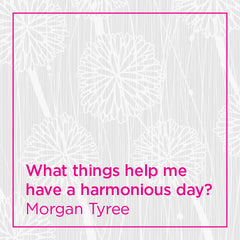 So for an example, for me, I don't make my bed daily because my bedroom's upstairs and it really doesn't impact my day at all. Like I have several things I do as part of a tidying routine and that's not one of them and it doesn't affect my day. Now if it did, I would. And so it's important to kind of know yourself and say, “What things help me have a harmonious day?” And then really kind of following that for you, because I think it's the things that are impacting your day in a negative way are the things you want to improve upon. If you're forgetting things or you can't find your keys every morning, those are the things you want to work on, because that's the whole point of being organized.
So for an example, for me, I don't make my bed daily because my bedroom's upstairs and it really doesn't impact my day at all. Like I have several things I do as part of a tidying routine and that's not one of them and it doesn't affect my day. Now if it did, I would. And so it's important to kind of know yourself and say, “What things help me have a harmonious day?” And then really kind of following that for you, because I think it's the things that are impacting your day in a negative way are the things you want to improve upon. If you're forgetting things or you can't find your keys every morning, those are the things you want to work on, because that's the whole point of being organized.
Dr. Barb: So that makes sense that the space that you're really most connected to or spending much of your time with or needing to be most productive in is probably the area that needs more of the time or focus.
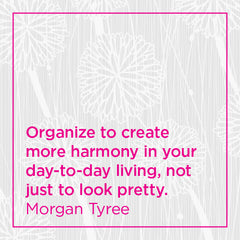 Morgan: Yeah, and I think like creative people, the more right-brained people, they generally do a much better job, or they prefer to have a lot more in their surroundings. I'm more of a minimalist by nature. I like tidy or cleaner surfaces. So know that about yourself, and neither one is right or wrong. And a lot of my clients are more visual that way and so we intentionally set up their systems more that way because they're going to be able to maintain that system. Because if I set up a system that would work for me, it's not going to work for them necessarily long term. And so I just think that's the whole point. You have to keep going back to saying, "It's not just about getting organized, it's about organizing a system that you can maintain that's going to make your life run smoother." Because that's the whole point. You're not organizing just so it looks pretty, you're organizing so that your life can run and hopefully create more harmony in your day-to-day living.
Morgan: Yeah, and I think like creative people, the more right-brained people, they generally do a much better job, or they prefer to have a lot more in their surroundings. I'm more of a minimalist by nature. I like tidy or cleaner surfaces. So know that about yourself, and neither one is right or wrong. And a lot of my clients are more visual that way and so we intentionally set up their systems more that way because they're going to be able to maintain that system. Because if I set up a system that would work for me, it's not going to work for them necessarily long term. And so I just think that's the whole point. You have to keep going back to saying, "It's not just about getting organized, it's about organizing a system that you can maintain that's going to make your life run smoother." Because that's the whole point. You're not organizing just so it looks pretty, you're organizing so that your life can run and hopefully create more harmony in your day-to-day living.
Dr. Barb: Let's talk about your new book, Take Back Your Time. So can you tell us about just generally what it's about and for my guests who are listening today and oftentimes midlife and beyond, we talk a lot about self care and I think your book touches on that somewhat. Can you just tell us about the book?
Morgan: Yes, definitely. So obviously, I mean, I do a lot of coaching and helping with people and a lot of it comes back to really how you kind of spend your time and manage your time. And so the book, the premise is really about having a mindset of intentionality, and just what I mean by that, I feel like we live in a more distracting time than ever. Because we have so much information overload and it's not necessarily a bad thing, but I think that the importance of being intentional is more important than ever because we can't... Our time can get away from us. And so the colors on the book are red, yellow, green, and they stand for just kind of different times as far as kind of zoning our time and being intentional about when we do certain tasks. And so you mentioned self care, and so the red time zone is supposed to be that time when you slow down and you have some rest, and I call it your fill time.
I would say for most of us we probably generally will gravitate towards one or the time zones more naturally. And me personally, I'm more of a goer and a doer. So I'm the green, like go-get-her done girl. And so I have to be more intentional to get my red times on it. And so one thing I do when it comes to self care is I work on treating my self care as almost like appointments as far as just saying, "These need to be scheduled things. Because if I don't make them a top priority or a scheduled to do, they can often get shifted as almost like a well if I get to it." and I think as women that can be a common challenge for us because it can almost be like, "Well, if I can squeeze it in." As opposed to a foundational thing, which it really needs to be.
Dr. Barb: Well, I'm really glad you said that because I feel like that's kind of a conversation that I'm having over and over again, and women recognizing the importance of making a priority but just frankly don't. And I think a lot of women need permission to make the time for themselves over and above some of the other things they see as their responsibility as well. So it sounds like your book helps individuals work toward that goal. Is that correct?
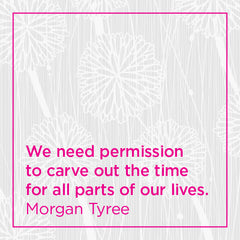 Morgan: Absolutely. Yeah. I think we need permission to carve out the time for all parts of our lives. And that's again kind of going back to that word harmony. I mean, I don't think we're going to ever have this perfect balance, but we shouldn't be living this frazzled existence. We should have some sense of up and down as far as fluidity of getting the fill time. And I have the flex time in there, which as moms we all know how to flex and move through the days and all the different things we have, all the different hats we wear. And yeah, I think women, we need to really prioritize our self care and not feel like that's a selfish thing. It should actually be something that we recognize as something that allows us to be our best selves. It's really something that I know when I prioritize it, I'm better at all my roles because I'm able to fill my cup up and then I'm able to give more rather than just running on fumes.
Morgan: Absolutely. Yeah. I think we need permission to carve out the time for all parts of our lives. And that's again kind of going back to that word harmony. I mean, I don't think we're going to ever have this perfect balance, but we shouldn't be living this frazzled existence. We should have some sense of up and down as far as fluidity of getting the fill time. And I have the flex time in there, which as moms we all know how to flex and move through the days and all the different things we have, all the different hats we wear. And yeah, I think women, we need to really prioritize our self care and not feel like that's a selfish thing. It should actually be something that we recognize as something that allows us to be our best selves. It's really something that I know when I prioritize it, I'm better at all my roles because I'm able to fill my cup up and then I'm able to give more rather than just running on fumes.
Dr. Barb: Right. So your background includes fitness instruction, and now organizing. So in that order where you originally or formerly more involved around fitness and more recently organizing?
Morgan: Well, I would say fitness has always been... I call it kind of more of my hobby job only because it's always been my side thing. I've taught for over 25 years and it's just something I can't kind of quit. So I started in college and just haven't ever stopped. And I love it. It helps me obviously get my own fitness in, and I have a passion for leading people in fitness as well. And while fitness and organizing are, they're different. They are one in the same in a sense that they're both helping people to take care of themselves and better themselves.
Dr. Barb: So is there anything else you'd like the readers to know about your book, and tell us how we can find it as well.
Morgan: Oh, sure. Yeah. What I would say is that I give a lot of... There's a lot of almost kind of worksheets or you know, fill in charts. So there's some things in there that can be real practical if people want to take it to the next level. So there's some exercises. So if someone really wants to kind of peel back, like where is our time going and why am I not getting things done, or I want to really take on 2020 and you know, make this my best year yet. I feel like it's a really good workbook almost. But you can also just take it and read it as almost an inspirational book.
So it's a book that I hope encourages people wherever they're at. I start from a point of giving the reader that permission to just start by acknowledging the season you're in. Because I believe that different seasons of life give us different opportunities. And so when you really know what season of life you're in, you can almost start from that point and give yourself permission to do what you can do in that season. And you can find the book. It's at Amazon, Target, Barnes and Noble, all those places.
Dr. Barb: Good. Well, thank you.
Morgan: Yeah, thank you.
Dr. Barb: So as we conclude our time together today, Morgan, I like to ask individuals, where do you find fullness in your life and this season?
Morgan: Good question. Well, by nature, I'm a fairly driven person, so each year I set a lot of goals for myself and they vary between fitness goals, I'm usually training for a race. I love to read a lot. I'm really active as a parent and love to travel. And so I'm just really about seizing the day. I am a glass half full kind of person, and I don't know. I just feel like by nature, I'm very optimistic and I feel like by... I'm just an achiever by nature too. And I feel like... I don't know, I'm just kind of like a can-do kind of girl. And so I don't know if I'm really answering the question, but I feel so grateful that I get to do life, and I feel like I'm just kind of always up for a new challenge. And so I always just... I almost want more time to take on all the challenges.
Dr. Barb: Yeah. And it sounds like you have found a way to empower others doing what you love, and moving others forward to be a better version of themselves, so to speak.
Morgan: I hope so. Yeah. Though I've been nicknamed the Energizer Bunny, but again, I really do come alongside people and my goal is always to walk into their world and come alongside where they're at, and I want them to feel affirmed and supported. And my goal is to hold them accountable, because that's ... I think that's what we all need, is just accountability and then some tools along the way.
Dr. Barb: Well, thanks for your message. I think as we are thinking ahead to the new year, this is a great message to pass along, and thanks for your time today, Morgan.
Morgan: Well, thank you for having me. Appreciate it.
 Dr. Barb DePree, M.D., has been a gynecologist and women’s health provider for almost 30 years and a menopause care specialist for the past ten.
Dr. Barb DePree, M.D., has been a gynecologist and women’s health provider for almost 30 years and a menopause care specialist for the past ten.


0 comments